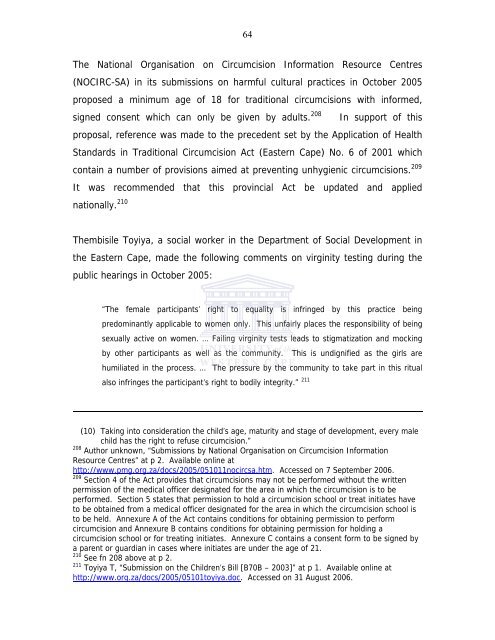Harmful traditional practices, (male circumcision - Electronic Thesis ...
Harmful traditional practices, (male circumcision - Electronic Thesis ...
Harmful traditional practices, (male circumcision - Electronic Thesis ...
Create successful ePaper yourself
Turn your PDF publications into a flip-book with our unique Google optimized e-Paper software.
64<br />
The National Organisation on Circumcision Information Resource Centres<br />
(NOCIRC-SA) in its submissions on harmful cultural <strong>practices</strong> in October 2005<br />
proposed a minimum age of 18 for <strong>traditional</strong> <strong>circumcision</strong>s with informed,<br />
signed consent which can only be given by adults. 208 In support of this<br />
proposal, reference was made to the precedent set by the Application of Health<br />
Standards in Traditional Circumcision Act (Eastern Cape) No. 6 of 2001 which<br />
contain a number of provisions aimed at preventing unhygienic <strong>circumcision</strong>s. 209<br />
It was recommended that this provincial Act be updated and applied<br />
nationally. 210<br />
Thembisile Toyiya, a social worker in the Department of Social Development in<br />
the Eastern Cape, made the following comments on virginity testing during the<br />
public hearings in October 2005:<br />
“The fe<strong>male</strong> participants’ right to equality is infringed by this practice being<br />
predominantly applicable to women only. This unfairly places the responsibility of being<br />
sexually active on women. … Failing virginity tests leads to stigmatization and mocking<br />
by other participants as well as the community. This is undignified as the girls are<br />
humiliated in the process. … The pressure by the community to take part in this ritual<br />
also infringes the participant’s right to bodily integrity.” 211<br />
(10) Taking into consideration the child’s age, maturity and stage of development, every <strong>male</strong><br />
child has the right to refuse <strong>circumcision</strong>.”<br />
208<br />
Author unknown, “Submissions by National Organisation on Circumcision Information<br />
Resource Centres” at p 2. Available online at<br />
http://www.pmg.org.za/docs/2005/051011nocircsa.htm. Accessed on 7 September 2006.<br />
209<br />
Section 4 of the Act provides that <strong>circumcision</strong>s may not be performed without the written<br />
permission of the medical officer designated for the area in which the <strong>circumcision</strong> is to be<br />
performed. Section 5 states that permission to hold a <strong>circumcision</strong> school or treat initiates have<br />
to be obtained from a medical officer designated for the area in which the <strong>circumcision</strong> school is<br />
to be held. Annexure A of the Act contains conditions for obtaining permission to perform<br />
<strong>circumcision</strong> and Annexure B contains conditions for obtaining permission for holding a<br />
<strong>circumcision</strong> school or for treating initiates. Annexure C contains a consent form to be signed by<br />
a parent or guardian in cases where initiates are under the age of 21.<br />
210<br />
See fn 208 above at p 2.<br />
211<br />
Toyiya T, “Submission on the Children’s Bill [B70B – 2003]” at p 1. Available online at<br />
http://www.org.za/docs/2005/05101toyiya.doc. Accessed on 31 August 2006.

















